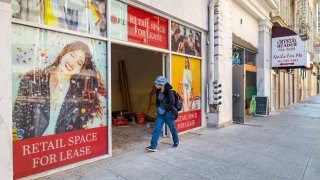
- Initial claims for unemployment benefits hit 1.4 million last week, according to the Labor Department. That's the highest level since mid-September.
- The dynamic points to rising layoffs, according to economists, while Congress continues talks on a Covid relief bill.
- Meanwhile, coronavirus cases are surging, job growth is slowing and there are millions more unemployed workers than available jobs.
Americans applied for unemployment benefits last week at the highest level in three months, signaling deepening job loss as a raging coronavirus pandemic continues its assault on the economy and Congress continues work on another relief package.
Nearly 1.4 million workers filed an initial claim for benefits last week, according to Labor Department figures issued Thursday. Workers file an initial claim to establish or re-establish eligibility for aid.
More from Personal Finance:
Covid relief bill would add $300 boost to jobless benefits for 16 weeks
Stimulus bill may include eviction moratorium, $25 billion in rental help
Will the next Covid relief bill contain $600 or $1,200 stimulus checks?
About 950,000 applied for traditional state unemployment insurance. Another 428,000 sought Pandemic Unemployment Assistance, a temporary federal program for self-employed, gig and other workers typically unable to collect state assistance.
Worsening outlook
Together, initial claims are at their highest point since mid-September.
"[The] rebound signals things aren't just stagnating, they're worsening," Daniel Zhao, an economist at Glassdoor, a job and recruiting site, said.

Nine months into the crisis, the volume of initial claims eclipses any pre-pandemic record.
Money Report
When stripping out data for the Pandemic Unemployment Assistance program, which was created in March by the CARES Act relief law, claims for state benefits are still higher than all but the worst week of the Great Recession.
'Resurgent virus'
"Layoffs appear to be rising, consistent with the resurgent virus," Heidi Shierholz, director of policy at the Economic Policy Institute, a left-leaning think tank, and former Labor Department chief economist, wrote Thursday in an analysis.
The U.S. recorded 3,124 new Covid-19 deaths on Wednesday, the deadliest single-day tally of the pandemic so far, according to a CNBC analysis of Johns Hopkins University data.
States like California have implemented new lockdown measures and stay-at-home orders to contain the outbreak.

Meanwhile, Congress is trying to hammer out details on another relief package. A deal has remained elusive for months.
Lawmakers are rushing to avoid a benefits cliff that looms at year's end, at which time jobless benefits will expire for millions of workers and federal eviction protections lapse.
Job growth last month slowed to its lowest level since May. There are about 4.2 million more unemployed workers than job openings, according to an analysis of federal data issued Wednesday.

Unemployment benefits generally replace half of a worker's lost wages. However, some workers get much less of a wage replacement due to weekly caps on aid amounts, which vary widely among states. Six states — Alabama, Arizona, Florida, Louisiana, Mississippi and Tennessee — cap their unemployment benefits at a level below the country's $7.25 hourly minimum wage.
Roughly 19 million Americans were collecting unemployment benefits at the end of November.
Multiple layoffs
Evidence suggests most new applications for unemployment benefits are coming from workers who have been laid off multiple times during the Covid pandemic.
Such claims accounted for 80% of all initial claims in California during the last week in October, according to a recent analysis published by the California Policy Lab. The U.S. Labor Department doesn't report such figures for the whole country.
"It's hard to know if these folks are applying for a second (or even third) time, but it's very likely," Eliza Forsythe, an assistant professor and labor economist at the University of Illinois, said of nationwide claims data.
Workers who re-enter the unemployment system essentially pick up where they left off, meaning they have fewer weeks of assistance available.
Repeat claims make it difficult to determine who may soon exhaust benefits, Forsythe said.
While the high level of unemployment claims is concerning, the extent to which Thanksgiving influenced last week's spike is unclear, she said. Workers who would have otherwise filed during the holiday week may have been pushed to the following week.
"I'd like to see another week of data before feeling comfortable saying that claims are rising," she said.






